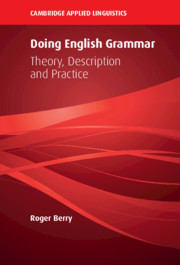Book contents
- Doing English Grammar
- The Cambridge Applied Linguistics Series
- Doing English Grammar
- Copyright page
- Contents
- Figure
- Tables
- Editors’ Preface
- Introduction
- 1 The Place of Grammar
- 2 What Is Grammar?
- 3 The Need for New Descriptions
- 4 Working with Terminology
- 5 Issues in Grammatical Description
- 6 Grammar in Operation
- 7 Case Study 1
- 8 Case Study 2
- 9 Case Study 3
- 10 Case Study 4
- Conclusion
- Appendices
- Index
- References
9 - Case Study 3
The Personal Pronouns
Published online by Cambridge University Press: 02 March 2021
- Doing English Grammar
- The Cambridge Applied Linguistics Series
- Doing English Grammar
- Copyright page
- Contents
- Figure
- Tables
- Editors’ Preface
- Introduction
- 1 The Place of Grammar
- 2 What Is Grammar?
- 3 The Need for New Descriptions
- 4 Working with Terminology
- 5 Issues in Grammatical Description
- 6 Grammar in Operation
- 7 Case Study 1
- 8 Case Study 2
- 9 Case Study 3
- 10 Case Study 4
- Conclusion
- Appendices
- Index
- References
Summary
This case study exhibits a classic example of metalinguistic relativity (Chapter 3) where one treatment has become so dominant that it obscures attempts at progress, namely the concept of ‘personal pronoun paradigm’: a table based variously on the categories of person, number and case that is universally familiar to learners and teachers of English. The chapter first describes a number of well-known structural problems with the paradigm, e.g. that you serves as both singular and plural (not to mention a lack of correspondence in other languages). It then goes on to discuss the wider issue of the usage of these pronouns, for example the way we is used ambiguously by politicians. Two issues are focused on, in particular, the use of you for generic reference where it applies not to specific individuals being addressed but generally, as in ‘It’s awful when you can’t remember someone’s name’); and secondly, the use of they with singular reference. This usage is widely employed to avoid specifying gender with all types of antecedent, e.g. ‘This employee … They told us …’. A survey of materials supports the claim that these phenomena are poorly publicised in descriptions and largely ignored in teaching despite their frequency.
- Type
- Chapter
- Information
- Doing English GrammarTheory, Description and Practice, pp. 184 - 208Publisher: Cambridge University PressPrint publication year: 2021



